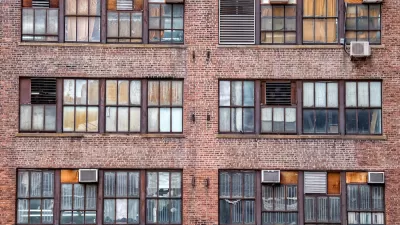A new book looks at the environmental, energy, and social consequences of keeping cool by using air conditioners. In this 4-minute public radio interview, author Stan Cox explains how to keep cool, just in time for the East Coast heat wave.
More importantly, he also provides alternatives to turning it on.
Cox notes that the improvement in a/c technology has been overcome by increase in home size and switching from room to central a/c, thus more energy is being used. [See Planetizen: "the efficiency paradox".]
In response to a question by Marketplace's Kai Ryssdal, Cox notes how a/c has affected community life:
"(O)one of the chief reasons I wrote the book was the ill ease I felt in going through neighborhoods that I knew had once been very lively places in the summer and then turned into dead zones. You would not see any human life out there, and the only sound would be the compressors and fans on the air conditioners. And I really do believe that what has been called by one author
>"nature deficit disorder" is a problem that has been facilitated by air conditioning.
FULL STORY: A summer without AC? It's possible

Maui's Vacation Rental Debate Turns Ugly
Verbal attacks, misinformation campaigns and fistfights plague a high-stakes debate to convert thousands of vacation rentals into long-term housing.

Planetizen Federal Action Tracker
A weekly monitor of how Trump’s orders and actions are impacting planners and planning in America.

Chicago’s Ghost Rails
Just beneath the surface of the modern city lie the remnants of its expansive early 20th-century streetcar system.

Bend, Oregon Zoning Reforms Prioritize Small-Scale Housing
The city altered its zoning code to allow multi-family housing and eliminated parking mandates citywide.

Amtrak Cutting Jobs, Funding to High-Speed Rail
The agency plans to cut 10 percent of its workforce and has confirmed it will not fund new high-speed rail projects.

LA Denies Basic Services to Unhoused Residents
The city has repeatedly failed to respond to requests for trash pickup at encampment sites, and eliminated a program that provided mobile showers and toilets.
Urban Design for Planners 1: Software Tools
This six-course series explores essential urban design concepts using open source software and equips planners with the tools they need to participate fully in the urban design process.
Planning for Universal Design
Learn the tools for implementing Universal Design in planning regulations.
planning NEXT
Appalachian Highlands Housing Partners
Mpact (founded as Rail~Volution)
City of Camden Redevelopment Agency
City of Astoria
City of Portland
City of Laramie





























